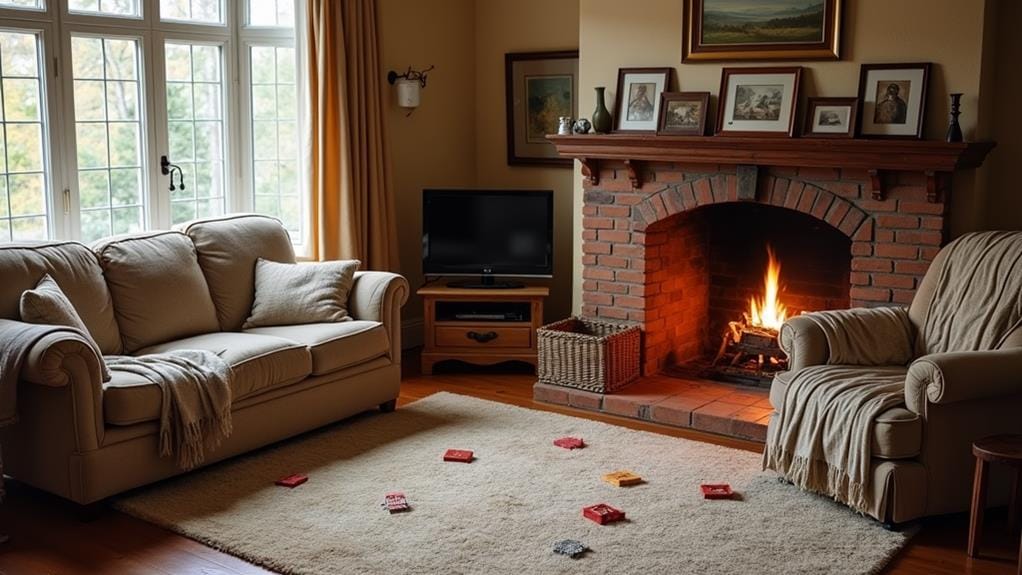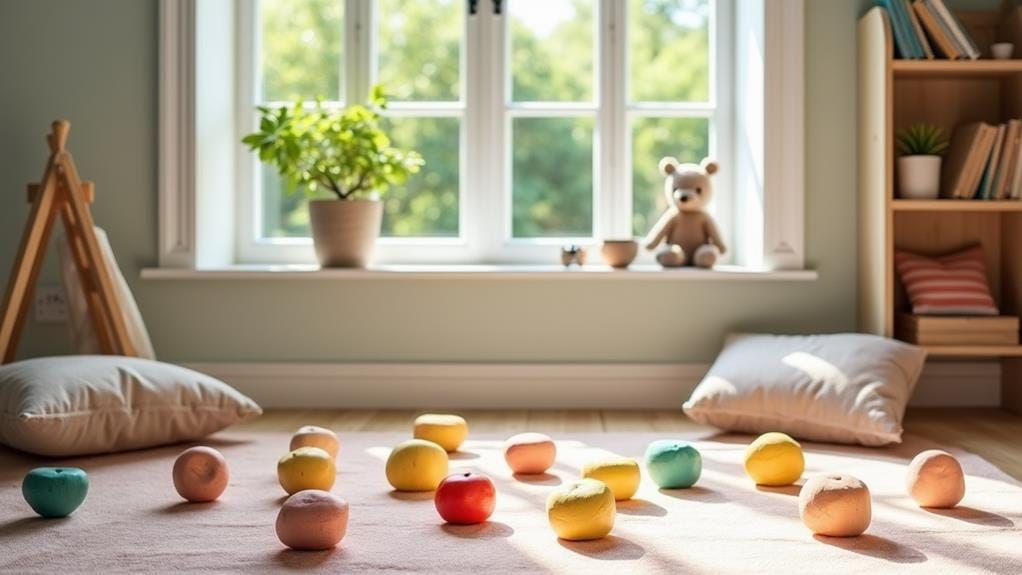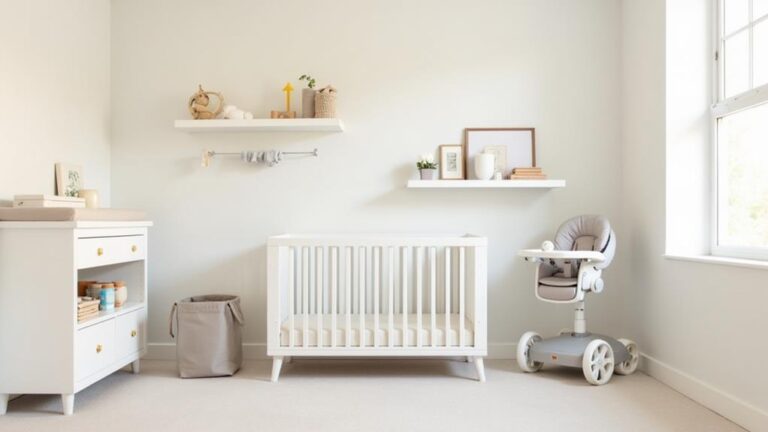Want happier kids without drowning in toys? It's simpler than you think! Focus on creating memories, not clutter. Foster emotional intelligence by teaching your little ones to express their feelings. Let them play freely – it's like magic for their developing minds! Cultivate gratitude together; it's a game-changer for family happiness. Build strong connections through regular family meals and open communication. And don't forget to praise effort over innate ability – it's the secret sauce for resilience. Remember, it's not about having more stuff, but about cherishing experiences and nurturing relationships. Ready to start this less-is-more parenting adventure?
Quick Takeaways
- Prioritize shared experiences over material possessions to create lasting happiness and emotional bonds.
- Foster emotional intelligence by teaching children to express and manage their feelings effectively.
- Encourage unstructured playtime to boost creativity, problem-solving skills, and cognitive development.
- Cultivate gratitude through daily practices to promote a positive outlook and emotional well-being.
- Build strong family connections through regular meals, open communication, and shared activities.
Prioritize Experiences Over Possessions
When it comes to raising happy kids, you might be surprised to learn that experiences trump possessions. It's true! Research shows that shared experiences create lasting happiness and stronger emotional bonds. So, instead of filling your home with more stuff, why not focus on creating positive memories?
Take your kids on family outings, encourage unstructured play outdoors, or involve them in community service. These activities foster creativity, resilience, and a sense of belonging. Plus, they're way more fun than another toy cluttering up the playroom!
Remember those tickets to the zoo you got for Christmas? That's the kind of gift that keeps on giving. Experiential gifts promote personal growth and create cherished memories. So, next time you're tempted to buy another gadget, ask yourself: Will this bring lasting joy, or just temporary excitement?
Foster Emotional Intelligence
Building on the idea of creating positive experiences, let's explore another key aspect of raising happy kids: fostering emotional intelligence. You know, it's not just about keeping their rooms tidy – it's about helping them tidy up their feelings too! Teaching your little ones to label and express their emotions is like giving them a superpower. It'll help them manage feelings better as they grow.
Want to boost their social skills? Encourage small acts of kindness – it's amazing how empathy can blossom! And don't forget the power of active listening. When you really tune in to your child's words, you're not just hearing them – you're helping them process their emotions. Oh, and try introducing some mindfulness practices. It's like yoga for their little minds, improving emotional regulation. Trust me, a emotionally intelligent kid is a happy kid!
Encourage Unstructured Playtime

Every child deserves the freedom to explore their imagination through unstructured playtime. You've got to make room for this essential ingredient in your little one's day! It's not just fun and games; it's a powerhouse for cognitive development and emotional regulation. Watch as your kiddo's creativity and social skills blossom during child-led play. And don't forget outdoor play – it's like a happiness booster shot!
But here's the kicker: in our overscheduled world, free play is on the decline. Yikes! It's time to declutter that activity calendar and make space for unstructured adventures. Let your munchkin take the lead, and you'll see their problem-solving skills and independence soar. Trust me, mama, it's worth it. Your child's self-esteem will thank you, and you'll be amazed at the confident little human you're raising.
Cultivate Gratitude
In light of today's fast-paced world, cultivating gratitude in your children is more essential than ever. It's not just about saying "thank you" – it's about fostering a positive outlook that'll serve them well into adulthood. Want to boost their emotional well-being and help them cope with life's challenges? Start by making gratitude a daily habit.
Family dinners are perfect for this! As you pass the peas, why not pass around some thankfulness too? It's a simple way to improve social interactions and even reduce the risk of substance abuse. Plus, it's a chance to nurture their emotional intelligence. Encourage your kids to express what they're grateful for, big or small. You'll be amazed at how this practice can lead to an optimistic mindset and long-term happiness. Who knew gratitude could be such a powerful parenting tool?
Build Strong Family Connections

While gratitude sets the stage for positivity, strong family connections form the foundation of a child's emotional well-being. Want to build those bonds? Start with these simple yet powerful strategies:
- Make family meals a priority – they're not just for nourishment, but for nurturing relationships too.
- Foster open communication through shared problem-solving activities.
- Plan regular family activities, from game nights to outdoor adventures.
Celebrate your kids' achievements, big and small. It's like filling their emotional tank with positive self-esteem fuel! Create a nurturing home environment with consistent routines – it's the secret sauce for emotional stability. And don't forget to sprinkle in plenty of laughter and love. After all, isn't that what family's all about? By strengthening these connections, you're giving your children the ultimate gift: a happy, resilient heart.
Promote a Growth Mindset
Embracing challenges head-on can set your kids up for a lifetime of success and happiness. Want to promote a growth mindset? It's all about how you praise your children. Instead of gushing over their smarts, focus on their effort and perseverance. "Wow, you really stuck with that puzzle!" goes a long way in building resilience.
Common Questions
Are Kids Happier With Fewer Toys?
Yes, kids are often happier with fewer toys. You'll find they're more creative, focused, and engaged in play. They'll appreciate what they have, develop better problem-solving skills, and interact more with others during playtime.
How Do You Raise a Happiest Child?
To raise the happiest child, you'll want to foster emotional intelligence, encourage unstructured play, practice gratitude, teach resilience, and engage in family routines. Focus on building strong relationships, promoting self-expression, and allowing them to face challenges independently.
How to Raise a Happy Kid in a Bad Family Environment?
You're facing a Herculean task, but don't despair! Create a safe haven within chaos, encourage emotional expression, and build external support networks. Teach problem-solving skills, foster resilience, and practice gratitude. You'll nurture happiness despite the challenging environment.
How to Make Kids More Happy?
To make kids happier, encourage emotional expression and unstructured play. Practice gratitude daily with them. Allow them to face challenges, building resilience. Model positive behaviors yourself. These actions will nurture their emotional growth and overall happiness.




